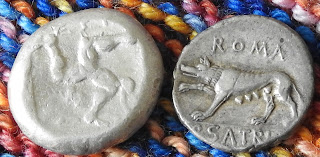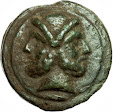Recently I bought two interesting coins:
Athens / Owl Tetradrachm from Athens – this is one of the best known ancient coins.
Hoplite / Triskeles Stater from Pamphylia Aspendos. These coins were rare until the last few years.
Attica, Athens AR Tetradrachm. Circa 454-404 BC.
Head of Athena right, wearing earring, necklace, and crested
Attic helmet decorated with three olive leaves over visor and a spiral palmette
on the bowl
Owl standing right, head facing; olive sprig and berry in
upper left field, AΘE to right; all within incuse square.
Struck on a flan that includes all of Athena’s helmet crest
and full reverse borders.
17.17 grams
1 h
· I thought the Crack-em-Out shirt by TIF was a good back ground for my slabbed owl.
·
Pamphylia, Aspendos, 465 - 430 BC, Silver Stater
Obverse: Hoplite warrior advancing right holding spear and round
shield. The end of the spear behind the soldier has some extra lines, like a
trident pointing the wrong way. I do not see them on other examples. The lines
could be an insect with 6 legs or flow lines on the die.
Reverse: Triskeles, 3 legs running, below - lion crouching
left in background, above - EΣT, all within incuse square.
10.73 grams
19.4 X 17.3 X 4.8 mm
Sear – 5381 - 5383 are similar, 5383 is the best but not exact
match, 460 – 420 BC
HISTORIA NVMORVM, Barclay Head – Pg 699, Fig 317, 500 – 400 BC
BMC – 19.93, 1-2 or 19.94, 9
SNG von Aulock 4482-3
Notes:
·
Part of the recent hoard of Athenian
tetradrachms which included these staters as well as a fewer from Cilicia.
·
The coin was sold as rare, but I found 750 similar
coins on acsearch (PAMPHYLIA Shield Triskeles). Something like a hoard significantly
changed availability. VCoins has 64 and MA Shops has 15 similar coins for sale.
·
Behind the Triskeles on the reverse are:
nothing, lion crouching left, lion standing left, lion jumping right, ivy leaf
/ vine or eagle.
·
Reverse inscription on my coin is EΣT.
o
Some coins replace the T with a turtle.
o
Head reported these inscreptions: E, EΣ, EΣT, EΣTFE,
EΣP, and others
o
The legend represents the Pamphylian form of the
name of Aspendos – EΣTVEDIYS
·
A hoplite was the most common type of heavily
armed foot-soldier in ancient Greece from the 7th to 4th centuries BC. The
principal weapons of a Hoplite infantryman were a long ash wood spear, a short
sword and a large circular shield. (ancient.eu/hoplite - Mark Cartwright)
·
Aspendos or Aspendus (Pamphylian: ΕΣΤϜΕΔΥΣ;
Attic: Ἄσπενδος) was an ancient Greco-Roman city in Antalya province of Turkey,
located about 40 km east of the modern city of Antalya, Turkey. It was situated
on the Eurymedon River about 16 km inland from the Mediterranean Sea.
·
Hoplite / Triskle coins have been featured on
several Coin Talk posts in the last few years. More information here: http://augustuscoins.com/ed/interesting/triskeles.html












No comments:
Post a Comment